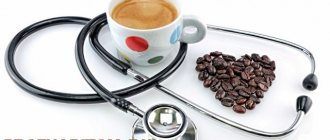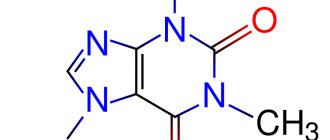Brain
The effect of caffeine on the blood vessels of the brain is specific - when ingested, caffeine leads to their narrowing. Along with the vasoconstrictor effect, caffeine also has other effects:
- accelerates metabolism locally
- stabilizes the functioning of cortical and subcortical structures
- eliminates drowsiness
- increases performance
- improves the flow of nutrients and oxygen to the brain
Heart and coronary arteries
In small doses, caffeine is beneficial for heart health because it:
- normalizes blood circulation and muscle function, which reduces the likelihood of angina, atherosclerosis and heart attack
- increases the speed of movement of the excitation wave with a weakened pulse
- increases resistance to exercise by stabilizing blood flow
- increases the flow of oxygen and nutrients due to the expansion of coronary vessels
Kidneys
Caffeine dilates the blood vessels of the kidneys, has a pronounced diuretic effect, accelerates the evacuation of waste and toxins from the body. At the same time, the alkaloid removes calcium, the deficiency of which negatively affects the health of bones, teeth, and hair. This side effect is not dangerous for people who drink no more than 2 cups of coffee per day and eat properly. After an hour, the effect of caffeine on the kidneys weakens - the blood vessels gradually narrow.
People with kidney pathologies are not recommended to abuse coffee and other caffeine-containing drinks. This reduces the risk of complications and exacerbation of chronic diseases.
Arterial pressure
The dilating effect of caffeine on blood vessels ensures an increase in the vascular lumen, which leads to an increase in blood pressure in both hypertensive and hypotensive patients. Therefore, people with fluctuations in blood pressure are not recommended to abuse caffeine-containing drinks, as the hypertensive crisis increases.
After consumption, caffeine causes an increase in the lower and upper blood pressure by 5-12 mm. Hg Art., and the effect lasts up to 4 hours. And in people who regularly take caffeine in various forms, the increase in blood pressure is insignificant.
Harm to blood vessels
In the absence of severe diseases of the cardiovascular system, caffeine has a beneficial effect on blood vessels and even 2-3 cups of caffeine-containing drinks will not cause harm to health. However, in the presence of diseases of the heart muscle and vascular system, even a small amount of caffeine can provoke pain in the heart muscle, headaches, dizziness, attacks of nausea and panic. Therefore, it is not recommended to drink caffeinated drinks for the following diseases:
- vegetative-vascular dystonia – caffeine enhances the symptoms and provokes the appearance of causeless anxiety and increased anxiety;
- hypertension – coffee causes an increase in blood pressure, which significantly worsens the general condition of the patient and can lead to a hypertensive crisis;
- myocardial damage with pain and heaviness in the area of the heart muscle, which are associated with a deficiency of potassium, calcium, magnesium, which are washed out with excessive consumption of coffee and other caffeinated drinks;
- angina pectoris and tachycardia, in which caffeine increases their symptoms and provokes complications;
- vascular aneurysm - caffeine has a destructive effect on the vascular walls and can provoke hemorrhage;
- glaucoma - an alkaloid aggravates the course of the disease, as it increases intraocular pressure.
Vasoconstrictor effect
Vasoconstriction of the gastrointestinal tract helps stimulate digestion. The benefits are obvious: caffeine helps break down fats and carbohydrates, but the substance slows down intestinal motility.
Coffee constricts blood vessels in the pelvic organs, which leads to a reduction in pain due to inflammation of the bladder. When drinking the drink, women note a decrease in painful symptoms and a decrease in discharge during menstruation.
Having analyzed the mechanisms of action of caffeine, we can note important positive and negative aspects:
| Organs and systems | pros | Minuses |
| Brain vessels | Stimulates activity and thinking ability, prevents spasms. Oxygen transport improves due to blood flow | Causes addiction and anxiety |
| The cardiovascular system | Reduces the risk of disease | Increases blood pressure |
| Gastrointestinal tract | Improves digestion | Slows down the movement of intestinal contents |
| Endocrine system | Reduces the risk of developing diabetes, improves metabolism | Impairs calcium absorption |
| Kidneys | Diuretic effect, reduction of pain in cystitis | Leaching of magnesium and vitamins |
Who should give up the drink?
The following are absolute contraindications for drinking coffee:
- children under 12 years of age;
- 1st trimester of pregnancy;
- lactation;
- arterial hypertension;
- acute circulatory disorder in the heart and brain;
- tachyarrhythmia;
- increased sodium levels in the blood;
- impaired renal function, which is accompanied by excessive urine production;
- exacerbation of ulcerative lesions of the stomach and intestines;
- old age – more than 75-80 years;
- glaucoma;
- abnormal vasodilation;
- early postoperative period - 7-10 days after any surgical interventions on the heart or brain;
- serious atherosclerotic lesions of the arteries;
- traumatic brain injury.
There are also conditions that require limiting coffee consumption to 1-2 cups per day. These include the following:
- age 12-18 years;
- 2-3 trimester of pregnancy;
- tendency to increase blood pressure;
- sleep disorders;
- mental pathologies that are accompanied by severe agitation;
- nervous overexcitement.
Coffee causes blood vessels to expand or contract – it all depends on their location. In order for the drink to bring only benefits and not aggravate existing diseases, it is important to use it correctly, strictly observing the dosage.
IS COFFEE ADDICTION DANGEROUS?
You quickly get used to coffee: if you drink it regularly for one to two weeks, you may become addicted. It manifests itself in sleep disturbances, irritability, nervous disorders, and inability to concentrate on work without a cup of aromatic drink.
On average, caffeine is eliminated from the human body in 6 hours. But its withdrawal syndrome affects itself within 10-12 hours after drinking a portion. Therefore, the habit of drinking espresso in the morning helps people addicted to coffee. Getting rid of the syndrome is simple: just give up products containing caffeine. By gradually reducing their dose in the diet, within ten days you can independently normalize the body’s attitude towards coffee.
Of course, the most active ingredient in coffee is caffeine. It is he who has such a stimulating effect, banishes drowsiness, and affects the entire central nervous system of the body. The drink has this effect not only due to caffeine. Coffee contains many other components and their compounds:
- carbohydrates
- magnesium
- potassium
- iron
- manganese
- fats
- essential oils
These components in the composition of your favorite drink are useful for humans and with reasonable consumption of coffee, it has a positive effect on the body and our well-being:
- invigorates and gives strength
- relieves fatigue and increases performance
- significantly enhances mental activity and concentration
- improves mood
Caffeine is an alkaloid from the methixanthine group, which has a doping effect on the body. This means that the substance can temporarily reduce the need for sleep, reduce the feeling of fatigue and significantly increase physical and mental performance. This effect is due to the formation of a psychostimulating effect on the cerebral cortex.
The benefits and harms of coffee for blood vessels
This invigorating drink has a number of benefits :
- Activates brain function, improves memory.
- Improves mood. Caffeine promotes the production of dopamine, the pleasure hormone, so it relieves symptoms of depression.
- Strengthens the heart. Potassium and magnesium saturate the heart muscle.
- Fights infections and promotes their rapid removal from the body.
- Reduces the risk of developing gastrointestinal cancer.
- Tones the skin. Increased blood circulation normalizes lymph flow, removes excess fluid, and prevents the appearance of edema.
- Prevents caries. Nicotinic acid kills germs on teeth.
But in addition to the benefits of coffee, there are harms :
- It can cause atherosclerosis. This occurs due to the production of cholesterol.
- It provokes gastritis, especially if you drink it on an empty stomach.
- Leads to arrhythmia due to increased heart rate.
- It may cause skin and hair problems because it blocks the production of thyroid hormones. This leads to incomplete absorption of vitamins and minerals.
- Causes darkening of teeth.
Effect on blood pressure
After consuming caffeine, a healthy person first experiences a slight dilation of smooth muscle vessels and a constriction of brain vessels. This effect does not affect blood pressure.
Blood flow provides good oxygen transport capacity in the circulatory system. Adrenaline stimulates the muscles, causing a surge of energy.
With rational intake of the drink, there is no change in pressure if we are talking about a relatively healthy person who does not have pathological disorders of the cardiovascular system.
If you have heart and vascular diseases, as well as individual intolerance, drinking coffee can cause negative consequences.
How to drink coffee correctly with vegetative-vascular dystonia
About 40% of people suffering from vegetative-vascular dystonia claim that after consumption they begin to feel significantly worse. They feel anxious, their heart rate increases, etc.
to say that all people with VSD are prohibited from drinking it. Dystonia is divided into types: hypertensive, hypotonic and mixed. The indicated 40% are of the hypertensive or mixed type. In these cases, coffee is harmful. But with hypotension, doctors recommend that patients drink a cup of espresso to increase blood pressure without medications.
Finally, one piece of advice. In order to decide whether coffee is harmful to you or not, it is better to consult a doctor!
What does it do with the pressure: does it lower or increase?
Scientists have repeatedly conducted research on this matter. The result is that blood pressure increases, but this effect is observed only in the first hour after drinking a coffee drink . And at the same time, the lower the initial blood pressure, the higher it rises.
In hypertensive patients , for example, an increase of only 2 to 5 millimeters of mercury was observed, which practically in no way affected their well-being.
But in hypotensive people , with a pressure of about 80/60, the pressure increases by almost 20 millimeters of mercury (mainly diastolic), so caffeine really helps them with headaches (including as part of medications such as Kofalgin).
But systolic pressure (heart pressure, upper pressure) may even decrease slightly if you drink just a little coffee. At the same time, the vessels dilate slightly, but the heart rate does not increase, so the blood flow slows down. If you drink a full cup of coffee, the heart begins to pump blood more actively (due to the tonic effect) - the pressure increases. But it still stabilizes within 1 – 2 hours.
How to reduce the harm from coffee
Coffee and vessels can be an unpredictable combination. If you want to minimize the harm of the drink, you should use the following methods to weaken the effect of caffeine:
- drink a caffeine-free drink - this substance is also present in such a product, but in minimal quantities;
- mix coffee with milk - it is worth considering that as a result the drink becomes more caloric and increases the likelihood of constipation;
- drink the drink with citrus fruits - lemons or oranges are suitable as additions.
There are several ways to reduce the harmful effects of coffee
Effect on veins and arteries
Answering the question of how coffee affects blood vessels, it is worth noting that frequent consumption of the drink causes destruction of the venous system. This is due to an increase in load on the vessels. Excessive amounts of coffee in the diet impair the functioning of muscle tissue. With tissue contraction, the vascular lumen is significantly reduced. As a result, headaches appear, coordination of movements is impaired, and limbs turn pale.
Coffee poses a danger to the heart and blood vessels if you have chronic diseases. In advanced situations, irreversible degenerative processes are observed, heartbeat disturbances occur, and wear and tear on the walls of blood vessels accelerates. There is also a risk of uncontrolled spasms and decreased venous lumen. Caffeine has additional effects that may worsen health problems. The drink can be beneficial if you need to stimulate or reduce blood circulation in certain areas, but most often medications are prescribed for this.











